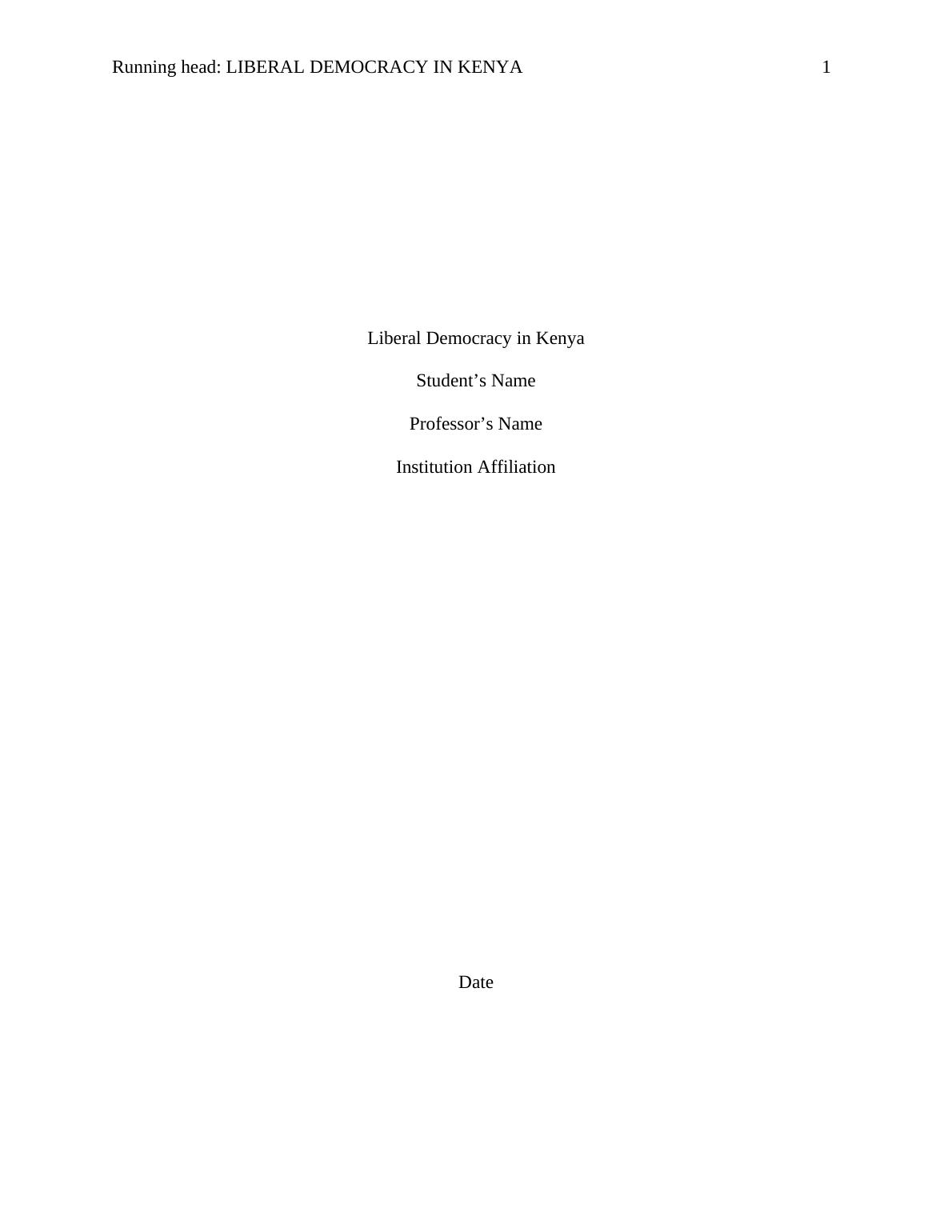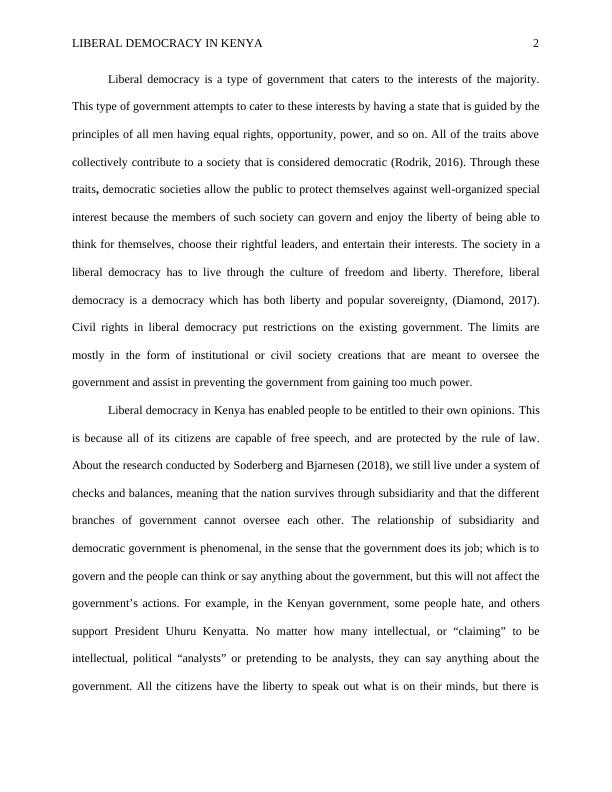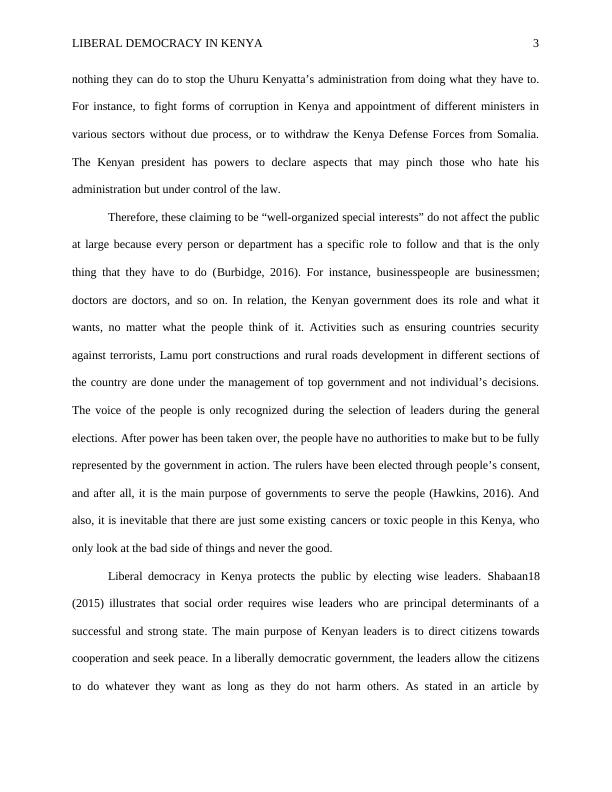Liberal Democracy in Kenya
Added on 2023-04-11
8 Pages1737 Words222 Views
Running head: LIBERAL DEMOCRACY IN KENYA 1
Liberal Democracy in Kenya
Student’s Name
Professor’s Name
Institution Affiliation
Date
Liberal Democracy in Kenya
Student’s Name
Professor’s Name
Institution Affiliation
Date

LIBERAL DEMOCRACY IN KENYA 2
Liberal democracy is a type of government that caters to the interests of the majority.
This type of government attempts to cater to these interests by having a state that is guided by the
principles of all men having equal rights, opportunity, power, and so on. All of the traits above
collectively contribute to a society that is considered democratic (Rodrik, 2016). Through these
traits, democratic societies allow the public to protect themselves against well-organized special
interest because the members of such society can govern and enjoy the liberty of being able to
think for themselves, choose their rightful leaders, and entertain their interests. The society in a
liberal democracy has to live through the culture of freedom and liberty. Therefore, liberal
democracy is a democracy which has both liberty and popular sovereignty, (Diamond, 2017).
Civil rights in liberal democracy put restrictions on the existing government. The limits are
mostly in the form of institutional or civil society creations that are meant to oversee the
government and assist in preventing the government from gaining too much power.
Liberal democracy in Kenya has enabled people to be entitled to their own opinions. This
is because all of its citizens are capable of free speech, and are protected by the rule of law.
About the research conducted by Soderberg and Bjarnesen (2018), we still live under a system of
checks and balances, meaning that the nation survives through subsidiarity and that the different
branches of government cannot oversee each other. The relationship of subsidiarity and
democratic government is phenomenal, in the sense that the government does its job; which is to
govern and the people can think or say anything about the government, but this will not affect the
government’s actions. For example, in the Kenyan government, some people hate, and others
support President Uhuru Kenyatta. No matter how many intellectual, or “claiming” to be
intellectual, political “analysts” or pretending to be analysts, they can say anything about the
government. All the citizens have the liberty to speak out what is on their minds, but there is
Liberal democracy is a type of government that caters to the interests of the majority.
This type of government attempts to cater to these interests by having a state that is guided by the
principles of all men having equal rights, opportunity, power, and so on. All of the traits above
collectively contribute to a society that is considered democratic (Rodrik, 2016). Through these
traits, democratic societies allow the public to protect themselves against well-organized special
interest because the members of such society can govern and enjoy the liberty of being able to
think for themselves, choose their rightful leaders, and entertain their interests. The society in a
liberal democracy has to live through the culture of freedom and liberty. Therefore, liberal
democracy is a democracy which has both liberty and popular sovereignty, (Diamond, 2017).
Civil rights in liberal democracy put restrictions on the existing government. The limits are
mostly in the form of institutional or civil society creations that are meant to oversee the
government and assist in preventing the government from gaining too much power.
Liberal democracy in Kenya has enabled people to be entitled to their own opinions. This
is because all of its citizens are capable of free speech, and are protected by the rule of law.
About the research conducted by Soderberg and Bjarnesen (2018), we still live under a system of
checks and balances, meaning that the nation survives through subsidiarity and that the different
branches of government cannot oversee each other. The relationship of subsidiarity and
democratic government is phenomenal, in the sense that the government does its job; which is to
govern and the people can think or say anything about the government, but this will not affect the
government’s actions. For example, in the Kenyan government, some people hate, and others
support President Uhuru Kenyatta. No matter how many intellectual, or “claiming” to be
intellectual, political “analysts” or pretending to be analysts, they can say anything about the
government. All the citizens have the liberty to speak out what is on their minds, but there is

LIBERAL DEMOCRACY IN KENYA 3
nothing they can do to stop the Uhuru Kenyatta’s administration from doing what they have to.
For instance, to fight forms of corruption in Kenya and appointment of different ministers in
various sectors without due process, or to withdraw the Kenya Defense Forces from Somalia.
The Kenyan president has powers to declare aspects that may pinch those who hate his
administration but under control of the law.
Therefore, these claiming to be “well-organized special interests” do not affect the public
at large because every person or department has a specific role to follow and that is the only
thing that they have to do (Burbidge, 2016). For instance, businesspeople are businessmen;
doctors are doctors, and so on. In relation, the Kenyan government does its role and what it
wants, no matter what the people think of it. Activities such as ensuring countries security
against terrorists, Lamu port constructions and rural roads development in different sections of
the country are done under the management of top government and not individual’s decisions.
The voice of the people is only recognized during the selection of leaders during the general
elections. After power has been taken over, the people have no authorities to make but to be fully
represented by the government in action. The rulers have been elected through people’s consent,
and after all, it is the main purpose of governments to serve the people (Hawkins, 2016). And
also, it is inevitable that there are just some existing cancers or toxic people in this Kenya, who
only look at the bad side of things and never the good.
Liberal democracy in Kenya protects the public by electing wise leaders. Shabaan18
(2015) illustrates that social order requires wise leaders who are principal determinants of a
successful and strong state. The main purpose of Kenyan leaders is to direct citizens towards
cooperation and seek peace. In a liberally democratic government, the leaders allow the citizens
to do whatever they want as long as they do not harm others. As stated in an article by
nothing they can do to stop the Uhuru Kenyatta’s administration from doing what they have to.
For instance, to fight forms of corruption in Kenya and appointment of different ministers in
various sectors without due process, or to withdraw the Kenya Defense Forces from Somalia.
The Kenyan president has powers to declare aspects that may pinch those who hate his
administration but under control of the law.
Therefore, these claiming to be “well-organized special interests” do not affect the public
at large because every person or department has a specific role to follow and that is the only
thing that they have to do (Burbidge, 2016). For instance, businesspeople are businessmen;
doctors are doctors, and so on. In relation, the Kenyan government does its role and what it
wants, no matter what the people think of it. Activities such as ensuring countries security
against terrorists, Lamu port constructions and rural roads development in different sections of
the country are done under the management of top government and not individual’s decisions.
The voice of the people is only recognized during the selection of leaders during the general
elections. After power has been taken over, the people have no authorities to make but to be fully
represented by the government in action. The rulers have been elected through people’s consent,
and after all, it is the main purpose of governments to serve the people (Hawkins, 2016). And
also, it is inevitable that there are just some existing cancers or toxic people in this Kenya, who
only look at the bad side of things and never the good.
Liberal democracy in Kenya protects the public by electing wise leaders. Shabaan18
(2015) illustrates that social order requires wise leaders who are principal determinants of a
successful and strong state. The main purpose of Kenyan leaders is to direct citizens towards
cooperation and seek peace. In a liberally democratic government, the leaders allow the citizens
to do whatever they want as long as they do not harm others. As stated in an article by

End of preview
Want to access all the pages? Upload your documents or become a member.
